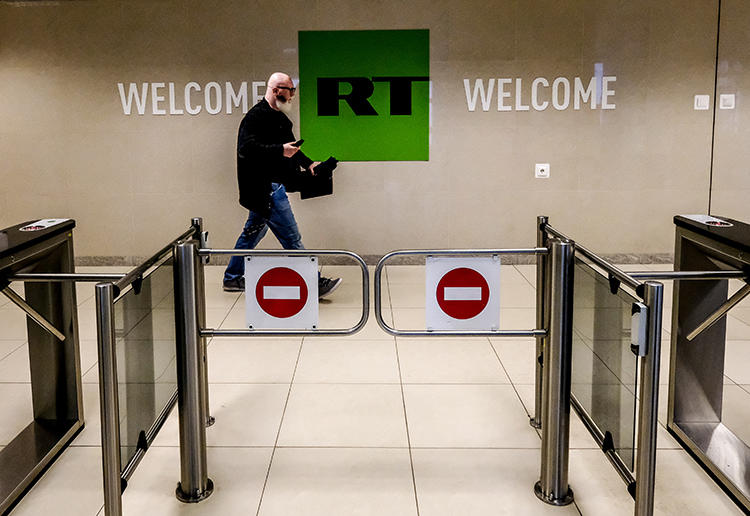Since 2017, U.S. legislators and the Department of Justice have required multiple foreign-funded news organizations to register under the Foreign Agent Registration Act (FARA), a law designed to compel transparency from agents of foreign entities operating inside the United States, according to news reports, public records, and letters from the Department of Justice.
The Department of Justice maintains that registration is reserved for cases in which foreign agents attempt to influence U.S. policy or public opinion on behalf of another state, according to a letter the department sent to U.S. senators, as reviewed by the Wall Street Journal.
But journalists at registered outlets who spoke to CPJ said that the FARA requirements, and the stigma attached with registering, hamper their ability to carry out normal journalistic activities.
In November 2017, the U.S. Department of Justice compelled the Russian-funded news outlet RT to register under FARA, as CPJ reported at the time and according to CPJ’s review of the outlet’s filings with the government.
Since it registered, as part of a FARA requirement to disclose any “information materials” registrants produce or distribute, RT has provided the Justice Department with information on its finances and ownership, and sent the department DVD copies of every program aired on the network. In one filing, RT listed emails and phone calls its journalists made with sources and potential interview subjects, which the outlet described as “normal journalistic functions.” It is unclear whether the list of contacts was required by the Department of Justice.
Soon after RT registered, the Radio-TV Correspondents Association, the body in charge of issuing press passes for the House and the Senate, revoked the outlet’s pass, citing the filing as a reason for the withdrawal, according to news reports.
In February 2019, the Chinese-funded China Global Television Network was also compelled to register under the act, and also saw its congressional passes revoked, according to reports and CPJ’s review of FARA filings. The network’s filings also include DVD copies of every show it has aired, but do not include lists of contacts made by its journalists.
In a letter to the broadcaster explaining why it needed to register, the Department of Justice said that the outlet “as a matter of policy, is designed and intends to influence American attitudes toward China, its policies, and its leaders, and does so on behalf of the Chinese state,” according to a report by The New York Times.
The Department of Justice has also requested Xinhua News Agency, funded by the Chinese government, to register under FARA, but the agency has not done so, according to CPJ’s review of FARA filings.
U.S. partners of RT and the Russian-funded Sputnik news agency have also registered under FARA since November 2017, most recently in May 2019, when the Department of Justice won a lawsuit against RM Broadcasting, which broadcasts Sputnik radio programming, forcing it to register, according to news reports.
Lawmakers have also requested that the Department of Justice pursue filings from the Qatari-funded broadcaster Al-Jazeera, according to public letters by legislators. Even though Al-Jazeera has not been compelled to register under FARA, some lawmakers have called for it to lose its Congressional press passes, according to those letters.
In a report issued in response to those legislators’ requests, Al-Jazeera denied that it operates as an agent of the Qatari government and compared itself to the U.K.-funded BBC, Canadian CBC, or German Deutsche Welle.
Paul Orgel, the executive committee chairman of the Radio-TV Correspondents Association, told CPJ via phone that organizations registered under FARA are not allowed to have press passes under the organization’s rule that passes cannot be issued to groups that engage in lobbying on behalf of any entity. He said that letters such as the one sent by lawmakers regarding Al-Jazeera have no influence on the organization’s credentialing decisions.
U.S.-based Sputnik editor Christopher Pyburn, RT news director Mikhail V. Solodovnikov, RT CEO Alex Yazlovsky, and China Global Television Network director Ma Jing have each individually registered as foreign agents under FARA, according to CPJ’s review of their filings.
No other staffers at the outlets have filed paperwork individually, according to CPJ’s review of FARA filings.
In her filing, Ma protested the registration requirement, writing that the broadcaster engages in the “same news gathering and reporting activities endemic to professional journalism.”
The United States-China Economic and Security Review Commission, an independent body created by the U.S. Congress to monitor the U.S. relationship with China, has recommended to Congress that all staff working at FARA-registered Chinese media outlets register as foreign agents with the Justice Department, according to news reports.
When Al-Jazeera journalists spoke to CPJ’s Alexandra Ellerbeck and Avi Asher-Schapiro for an article published in the Columbia Journalism Review last June, the journalists said that they might need to leave the company if it were forced to register under FARA, out of fear their credibility would be damaged. For the same article, journalists at RT said that the FARA registration was making it more difficult to book guests for news shows. More recently, a journalist with China Global Television Network told CPJ that staffers were worried about losing credentials to report from buildings and events in Washington, D.C.
Following RT’s registration in 2017, the Russian government compelled nine U.S. outlets in the country to register in a similar scheme, including Voice of America, in a move that Russian officials said was in retaliation for U.S. FARA enforcement, according to reports. In 2018, the U.S.-funded Radio Free Europe/Radio Liberty was fined for failing to register in Russia, according to local media.
A parallel effort to regulate foreign-funded outlets has been pursued by the U.S. Federal Communications Commission, and requires outlets to file periodic disclosures about their finances and relationship with parents companies abroad, according to the transparency watchdog Open Secrets, which reported that only two outlets have registered as such: the Turkish Anadolu Agency and MHz News LLC, a U.S.-based outlet broadcasting programming from France and Germany.
